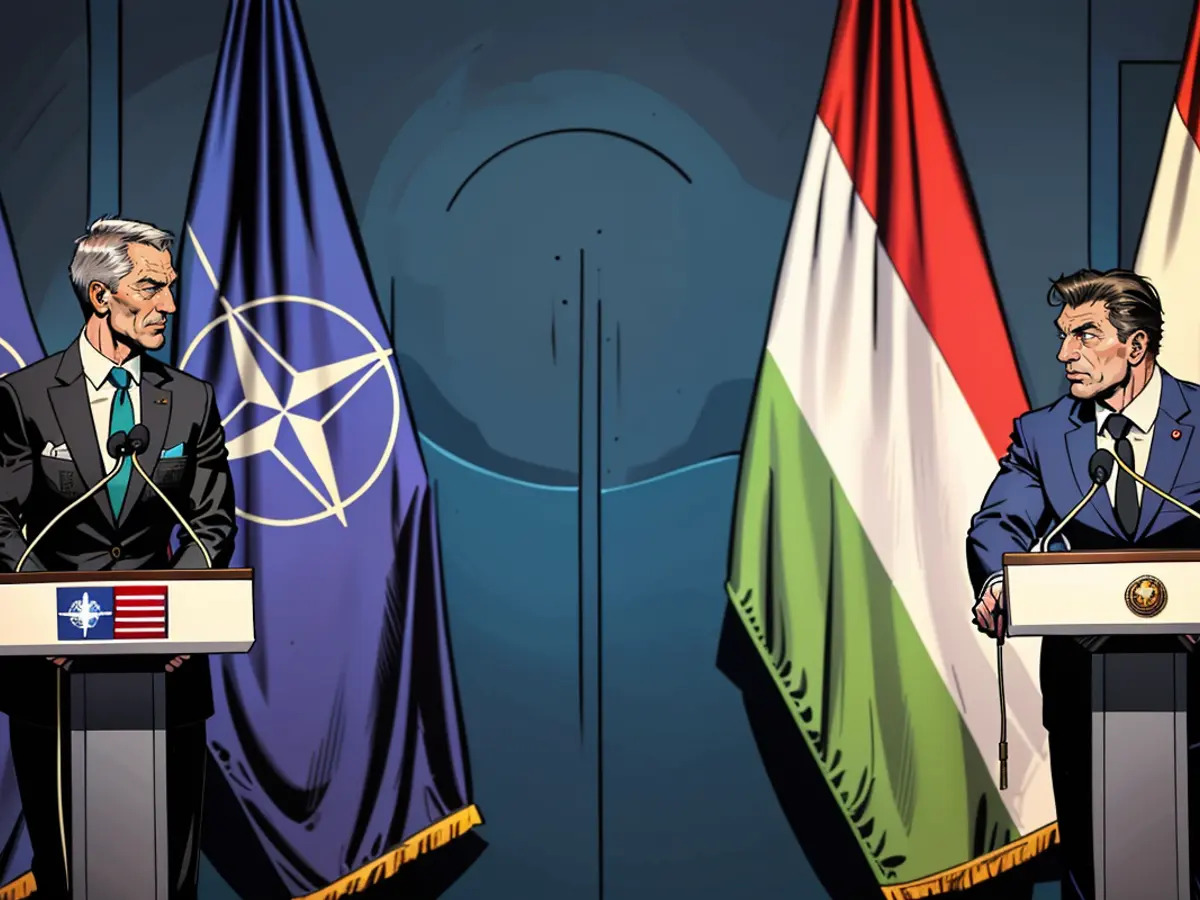NATO's Stoltenberg confirms lack of Ukraine aid plan with Hungarian involvement.
Up until now, the United States has been managing military aid for Ukraine via what's known as the Ramstein Group. Given the possibility of former President Donald Trump winning in November, Stoltenberg suggested that NATO, particularly European allies, step in to handle this role instead. This would make the assistance to Ukraine "Trump-proof," as per diplomats.
Nonetheless, Orban has threatened to block this move, which necessitates unanimous approval among NATO members. This blockage also encompasses the planned decision on long-term financial aid from NATO for Ukraine.
Stoltenberg stated that since the start of the Russian attack in February 2022, NATO member states have together contributed a total of 40 billion euros to Ukraine. He affirmed in Brussels, "We need to keep providing this level of support as a minimum as long as it's required."
Orban viewed his meeting with Stoltenberg in Budapest as a win. His country received assurances that Hungary wouldn't participate in any military deployments outside its borders related to the Ukraine conflict. He declared, "Hungary will not contribute financially to this war, will not send people to this war, and will not allow its land to be used for this war."
Orban is seen as Russia's closest ally in the EU and NATO and has refused to distance himself from Moscow despite Russia's invasion of Ukraine. Officials from several NATO countries were skeptical about a special arrangement for Hungary before Stoltenberg's visit to Budapest, worried that it could set a precedent for other nations. Similarly, the Slovakian government is also thought to be close to Russia.
Hungary has belonged to NATO for 25 years. Most recently, Orban's government has delayed Sweden's entry into the alliance.
Aside from Hungary, Romania and Slovakia, they have all been preventing a consensus on the successor of outgoing Dutch Prime Minister Mark Rutte as Stoltenberg's replacement. Critical comments by Rutte regarding the lack of rule of law in Hungary are believed to be the rationale. It is uncertain if this impasse can be resolved before the NATO summit in Washington in roughly a month.
Additionally, Orban's recent remarks during the European election campaign, likening the actions in the Ukraine war to those of Adolf Hitler in World War II, have incurred substantial criticism within NATO. Stoltenberg refrained from directly addressing this issue.
During the NATO Defense Ministers meeting, the initial focus is expected to be on additional air defense for Ukraine. German Defense Minister Boris Pistorius (SPD) can ask for more help for Kiev. Stoltenberg anticipates additional commitments being made.
Ukraine wants at least seven Patriot systems. Germany has promised one, while the US is said to be preparing to provide another, according to a news report. Italy could provide a SAMP/T system. Sweden, Spain, and Belgium are believed to have offered billions for the potential acquisition of an additional system.
Read also:
- Despite the lack of a Ukraine aid plan involving Hungary, NATO's Stoltenberg has urged European allies to take over the role from the United States.
- Donald Trump's potential return to power in November has prompted Stolensberg to suggest this shift, aiming to make the aid "Trump-proof."
- Viktor Orban's Hungary has threatened to veto this plan, which requires unanimous approval from NATO members, potentially blocking long-term financial aid for Ukraine as well.
- At a meeting in Budapest, Orban secured assurances that Hungary would not participate in military deployments outside its borders related to the Ukraine conflict.
- Jens Stoltenberg, the NATO secretary-general, acknowledged that NATO member states have contributed a combined 40 billion euros to Ukraine's aid since the Russian attack began in February 2022.
- In response to Hungary's opposition and delay of Sweden's NATO membership, Stoltenberg and the alliance must address critical comments about Hungary's lack of rule of law during the NATO summit in Washington.
- During the NATO Defense Ministers meeting, the focus is on providing additional air defense for Ukraine, with Germany, the US, Italy, Spain, and Belgium potentially offering support.







